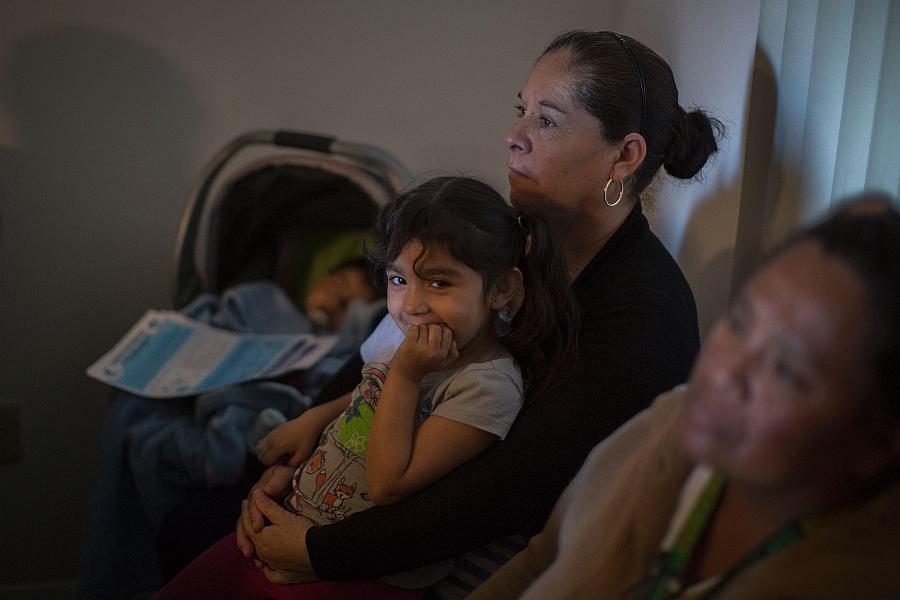In Calif., some fearful families think twice about keeping undocumented children on Medicaid

David McNew/Getty Images
The phone calls started right after the election.
Parents of undocumented children who qualify for California’s Medicaid program would ask to be unenrolled or have their personal information removed from databases, said Suzie Shupe, chief executive officer of the Redwood Community Health Coalition, a network of community health centers with 40 sites in Northern California.
As the president signed executive orders on immigration, the calls — and the fears — intensified.
“At first, we only had one or two clinics talking about this, but now everyone is saying they are having the experience,” Shupe said. “People are afraid and they want to take precautions. These are people who are truly eligible for services and should have nothing to fear.”
Under California’s SB 75, or Health for all Kids, all low-income children under the age of 19 in California are eligible for full-scope Medicaid benefits, regardless of their immigration status. Since Health for All Kids went into effect last May, more than 180,000 undocumented children have enrolled in comprehensive Medi-Cal, according to Children Now, a health advocacy group. While there are no figures available on the number families asking to be unenrolled, a recent survey from Children Now found families are “fearful, anxious and increasingly reluctant to share information.”
“We are proud to celebrate the anniversary of Health4AllKids and the state’s commitment to children’s health,” said Children Now President Ted Lempert in a release Tuesday. “But the threats on the federal level are affecting immigrant families. They’re scared, which has led them to avoid interactions with public services, even health coverage. We must do more so that all kids and families are able to access the health care coverage they need without fear.”
A changing political climate
Those fears were reflected in a recent survey Children Now conducted of 62 people throughout the state who work with immigrant communities (most work for health care provider organizations or agencies). The majority of those surveyed had heard from families who were reluctant to share their personal information for health coverage applications. Respondents also noted decreases in the numbers of doctor appointments made, increases in appointment “no shows,” and requests from families to withdraw from Medi-Cal health coverage.
That fits with what Pedro Toledo is seeing on the ground at the Petaluma Health Center in Northern California. While he hasn’t seen a decrease in health care visits in recent months, the center has had patients ask that their children be removed from Medi-Cal. And, the center has seen an increase in Spanish-speaking patients attending its anxiety and depression groups.
“My impression is that, in our area at least, our immigrant population is more anxious and afraid than previously,” said Toledo, the center’s chief administrative officer.
Asian Americans Advancing Justice Los Angeles, a legal and civil rights organization, is working to combat these fears in its outreach efforts, according to Doreena Wong, who monitors health care reform issues that affect Asian Americans, Pacific Islanders and Native Hawaiians.
While the anxiety began after the election, it was heightened after executive orders on immigration and a leaked draft of an executive order threatening some immigrants who receive public benefits with deportation, Wong said. Even though the order was not signed or released, such fears are still on people’s minds when they’re considering signing up for coverage or going to the doctor, she said.
Now, with the House of Representative’s recent passage of the American Health Care Act, families are questioning why they should enroll — and offer up their personal information — for coverage that might not last much longer, Wong said. The AHCA specifically targets Medicaid by changing the program to per capita block grants to states, dramatically reducing federal support over time, she said. (Such Medicaid reductions pose a threat to children’s health more broadly. And some health policy experts say California’s program expanding health care for undocumented immigrant children could be the first to go, reports Elizabeth Aguilera.)
Outreach efforts
Advancing Justice has been working with community partners to offer “Know Your Rights” presentations in languages such as Spanish and Chinese. At these meetings, attendees receive cards they can put in their wallet that detail their legal rights. The group is also working with agencies such as Covered California, the state’s health insurance exchange, to educate health consumers and spread the message that their information won’t be shared with immigration authorities.
Hearing the message from multiple sides is crucial, said Mike Odeh, director of health policy for Children Now. While information from health providers and clinics is useful, it’s also important to hear the same message echoed from trusted sources, such as faith and community leaders, he said.
But despite the broad messaging effort, some fears are hard to alleviate, especially in communities that were already hard to reach before the election, said Weiyu Zhang, who provides outreach and health coverage enrollment assistance in Southern California.
Even among mixed-status immigrant families whose children are U.S. citizens, concerns about health care is pervasive, she said: “Everyone is asking, what is going to happen to my health care? What should I do? People are feeling vulnerable about access.”
And that doesn’t bode well for children’s access to physical and mental, advocates say. Health coverage is linked to school attendance, and preventative care such as immunizations and dental check-ups can have a significant impact on long-term health, said Shupe of the Redwood Community Health Coalition.
“It’s scary to think what the impact could be for kids,” she said. “We’re a healthier society if everyone is getting preventative care.”
**

